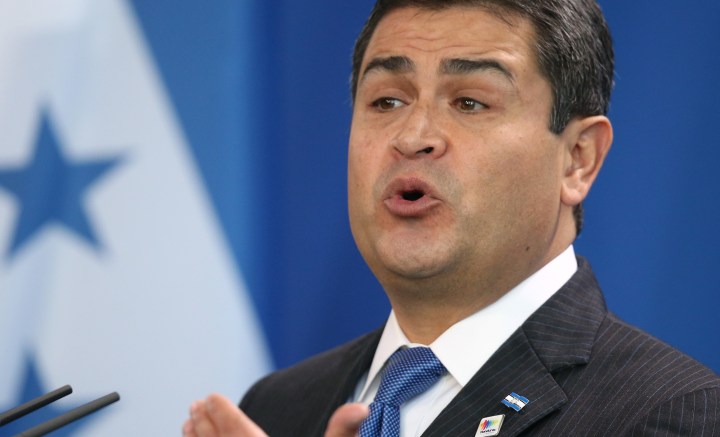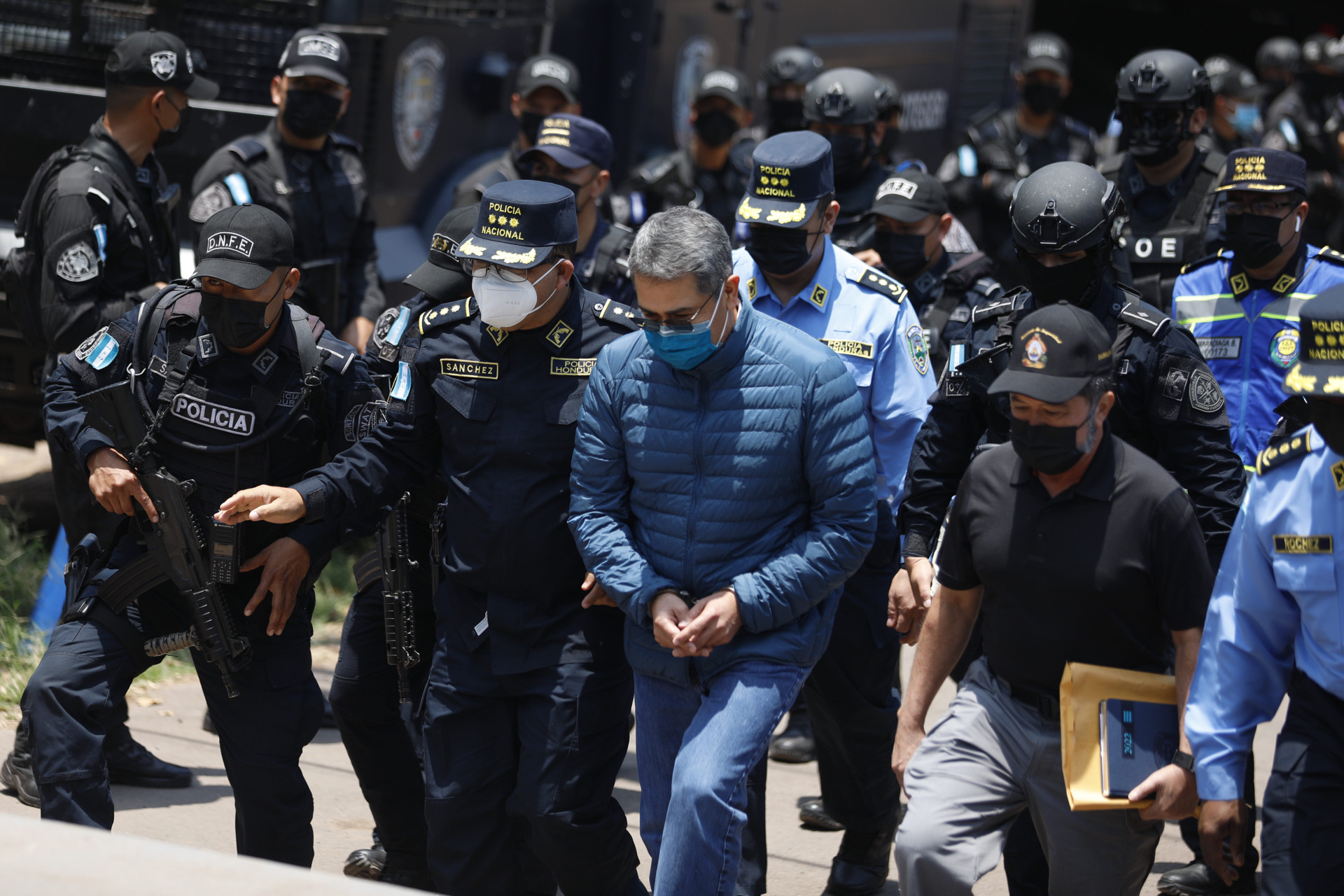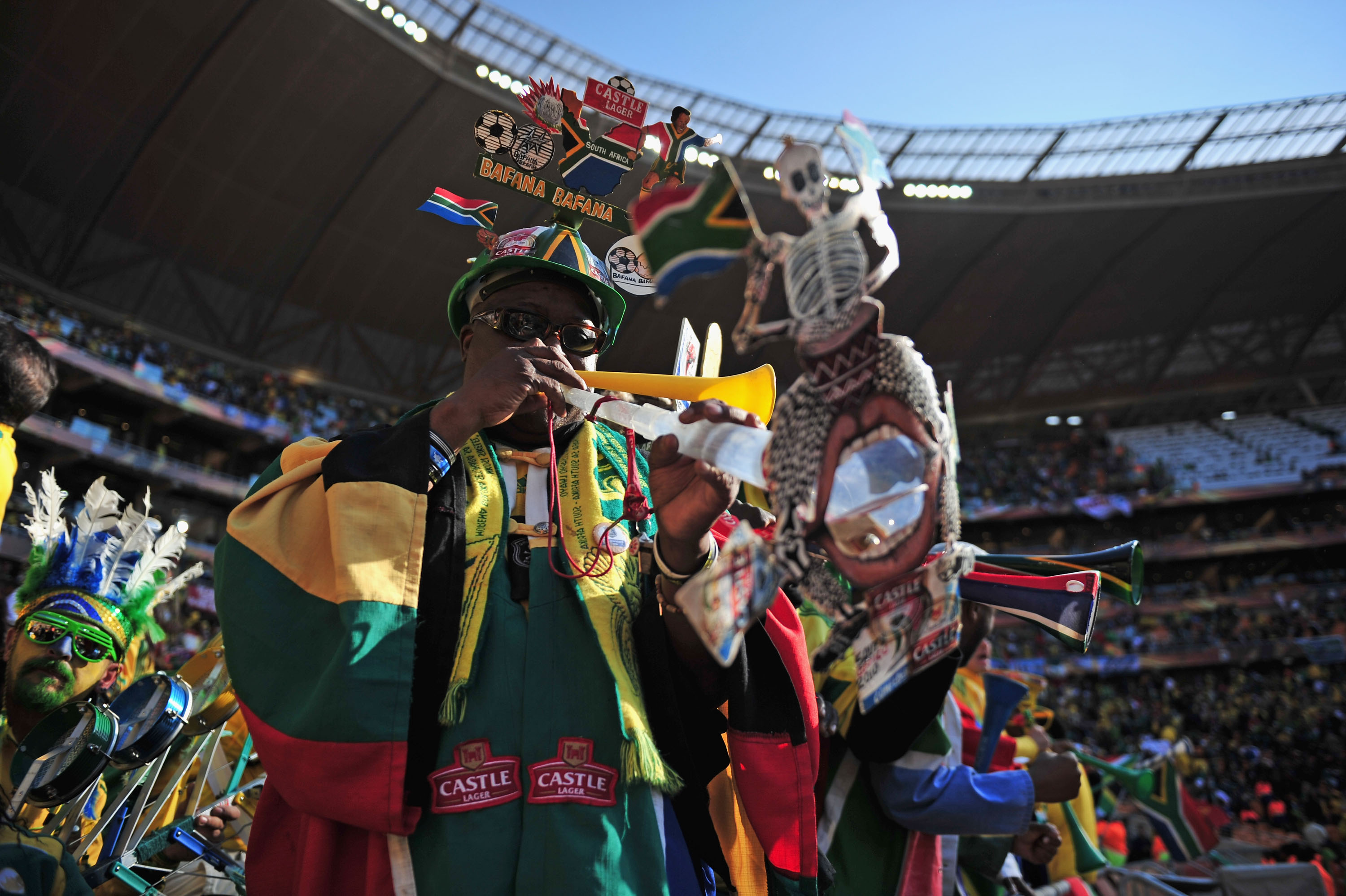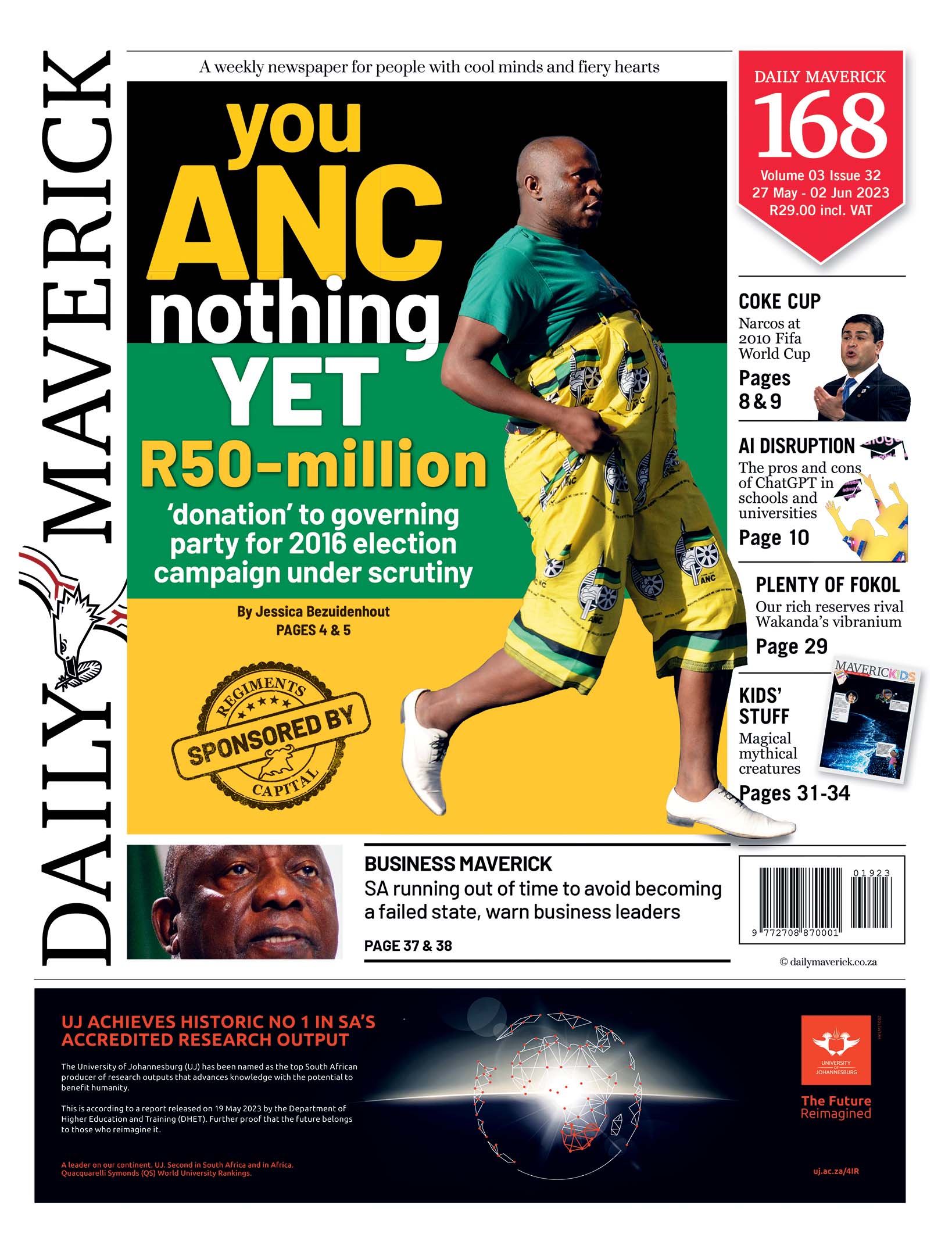GLOBAL NARCO CRIME
They visited 2010 Soccer World Cup together – now El Chapo’s cocaine allies could sink ex-Honduras president

Evidence that surfaced in the US places Honduran drug traffickers at the 2010 Soccer World Cup in South Africa. Some of the evidence suggests the former president of Honduras, Juan Orlando Hernández, who the US accuses of colluding with cartels and who denies it, was among them.
Evidence linked to drug cartel bosses suggests that former Honduran president Juan Orlando Hernández was with them at the 2010 soccer World Cup in South Africa, from where at least one was coordinating a mass cocaine consignment in a submarine.

Honduran police officers escort former Honduran president Juan Orlando Hernández (centre) to the airport for his extradition to the US. (Photo: Tomas Ayuso / Bloomberg via Getty Images)
This adds weight to the criminal charges relating to drugs and machine guns that Hernández is facing.
Hernández is accused in the US of colluding with some of the world’s most notorious drug cartels between 2004 and 2022 (he was Honduran president from 2014 to 2022) and turning his country into a narco-state.
He was extradited to the US last year, is in custody and is expected to go on trial there in September.
Hernández pleaded not guilty — he previously stated that his government managed to staunch the flow of drugs to the US, the very opposite of what he is accused of.
He also said narco-bosses he went after were now plotting against him.
Visiting the U.S., #Honduran President Hernández met with Acting Administrator Dhillon to further build upon the relationship with the #DEA, as we work jointly to combat drug trafficking. #DEA thanks @JuanOrlandoH and looks forward to our continued partnership with Honduras. pic.twitter.com/8c9jvXgFtm
— DEA HQ (@DEAHQ) March 1, 2019
Reinforcing Hernández’s stance is that in 2019 the US Drug Enforcement Administration posted on Twitter that Hernández was visiting from Honduras and that they were working “jointly to combat drug trafficking”.
El Chapo, $1m and protection
But flying in the face of that are high-level allegations stemming from the US against Hernández that suggest he colluded with drug lords.

Drug trafficker Joaquín Guzmán Loera, also known as El Chapo, is escorted to a helicopter by Mexican security forces in Mexico City on 22 February 2014. .m (Photographer: Susana Gonzalez / Bloomberg via Getty Images)
The indictment against Hernández accuses him of partnering with Joaquín “El Chapo” Guzmán Loera, the leader of Mexico’s Sinaloa Cartel, who the US sentenced to life imprisonment in July 2019.
In the indictment, it was alleged Hernández received $1-million in drug-trafficking proceeds from El Chapo.
“In exchange for the $1,000,000 from Guzman Loera, Hernández promised to continue protecting the Sinaloa Cartel’s drug-trafficking activities in Honduras,” the indictment said.
“[Hernández] abused his position as the president of Honduras to operate the country as a narco-state, in order to enrich himself and corruptly gain and maintain power; corrupted the legitimate institutions of Honduras, including parts of the Honduran National Police, military, and National Congress.”

A South African fan blows a vuvuzela at the opening ceremony of the 2010 Fifa World Cup South Africa Group A match between South Africa and Mexico at Soccer City Stadium in Johannesburg on 11 June 2010. (Photo: Clive Mason / Getty Images)
The indictment against Hernández also said he once told a Honduran drug trafficker, Geovanny Fuentes Ramirez, who was sentenced to life imprisonment in the US last year for cocaine smuggling, that he “was going to ‘stuff the drugs right up the noses of the gringos’.”
Legal action has already been taken against someone close to Hernández. In 2021, his brother Tony, a former Honduran congressman, was sentenced to life imprisonment in the US for drug and firearm-related crimes.
2010 Corruption Cup
Daily Maverick can now reveal that two convicted drug traffickers in the US have testified about attending the 2010 Fifa World Cup in South Africa — and a photograph suggests they were here with Hernández.
While Hernández’s wife, Ana, has publicly said they were at the World Cup but not for illicit reasons, the traffickers’ testimony could be used against Hernández, given the criminal charges he faces in the US.
At the time of the World Cup, Jacob Zuma was president of this country that went on to buckle under State Capture crimes, and that same year, 2010, Jackie Selebi, South Africa’s former national police commissioner, was convicted of corruption.
The 2010 World Cup, though, is bogged down in other controversies — it led to South Africa being accused of paying a $10-million bribe to host the event, and other government corruption allegations surfaced.
Now the revelation that top narco-bosses were probably in the stands at the 2010 soccer matches adds to those controversies.
Daily Maverick has previously reported on how global drug cartels use South Africa and favour the Port of Durban through which to operate.
SA’s trafficking warning
In the year ahead of the 2010 World Cup, Edna Molewa, South Africa’s minister of social development at the time, warned that while the event created opportunities it also created dangers.
“One of these is the expected increase in illicit trafficking, because South Africa is seen as a source, transit and destination country for drug trafficking,” she had said.
“We remain vigilant and we will heighten awareness campaigns to prevent undue exposure to drugs”.
In the years following the World Cup there were suspicions in policing circles that deals were brokered between intelligence agents and drug traffickers who were told to tone down obvious activities in South Africa, during the event which would see international focus placed on this country.
It seems, though, that some could not resist the soccer.
Honduran and Mexican cartels
The Pro-Honduras Network, an organisation based in the US, has been following the Hernández case as well as other related ones.
Daily Maverick obtained court papers including witness testimony, on a key case, some of which seems to have only recently become public, from the network.
The documents focus on Honduran cartel boss Arnulfo Fagot Máximo, also known as El Tio, who in 2019 was sentenced to 33 years in jail in the US.
According to the US Justice Department, it had been the State’s case that, “Fagot Máximo received cocaine along the Mosquitia coast from Colombia by ‘go fast’ boats, small aircraft and submersible vessels in quantities ranging from a few hundred to several thousand kilograms per delivery.”
The cocaine was later pushed to Mexican cartels for delivery to the US.
During the trial against Fagot Máximo, another convicted Honduran drug trafficker, Miguel Arnulfo Valle Valle, testified in 2018 that he and Fagot Máximo were at the 2010 World Cup together — they had stayed at the same hotel and socialised together.
(The indictment against Hernández referred to Valle and his brother Luis, saying they had channelled cocaine to El Chapo’s Sinaloa Cartel and also ensured “armed security for the transport of those shipments through Honduras”.)
Narco-submarine and ongoing bribery
In a transcript of Valle’s testimony from 2018, he said Fagot Máximo had to leave South Africa early during the World Cup “because there was a submarine with seven thousand kilos of cocaine arriving, and he had to come over [to Honduras] to take delivery of it”.
Valle had bought 500kg of that cocaine consignment.
Another convicted drug trafficker, Ronald Joel Carrion Zalabarria, testified roughly the same, thereby corroborating Valle.
Zalabarria, referring to a trip with Fagot Máximo, had said: “We went to the 2010 World Cup in South Africa.”

Former Honduran President Rafael Leonardo Callejas leaves the federal courthouse in Brooklyn, New York City on 28 March 2016. Callejas pleaded guilty to corruption charges for his role in the Fifa corruption scandal. (Photo: EPA / Andrew Gombert)
Meanwhile, Valle, in his testimony, also said another former Honduran president, Rafael Leonardo Callejas, once head of the Honduran soccer federation, was present at the 2010 World Cup.
According to the State, there was a photograph of Valle and Callejas “arm in arm” at the World Cup.
Fast-forward to 2016 and Callejas pleaded guilty in the US to accepting “bribes totalling hundreds of thousands of dollars” relating to Fifa world cups.
The US Justice Department said the bribes were “in exchange for his agreement to exercise his influence as [soccer federation president] to award contracts to Media World, a Florida sports marketing company, for the media and marketing rights to the Honduran national soccer team’s home World Cup qualifier matches for the 2014, 2018, and 2022 editions of the World Cup”.
Noted plus photographed
In the Fagot Máximo case, the 2018 testimony of convicted traffickers Valle and Zalabarria suggested that along with Fagot Máximo himself, and Callejas, they were all in South Africa for the 2010 World Cup.
Other evidence suggested Hernández was part of that crowd.
A copy of a handwritten note, understood to be from a now-former US Drug Enforcement Administration agent, said that “MV and El Tio” — presumably Miguel Valle and Fagot Máximo — attended the World Cup in South Africa and that they “met with Juan Orlando Hernández”.
The note also said they ate with him and talked about 7,000 kilograms — presumably of cocaine — in his presence.
A photograph of four men, which also formed evidence, appeared to show Valle with his right arm around Hernández’s shoulders while giving the thumbs-up with his left hand.

This image, apparently taken during the 2010 Soccer World Cup in South Africa, shows Honduran drug trafficker Miguel Arnulfo Valle Valle (far right) with his arm around the former president of Honduras, Juan Orlando Hernández. His wife, Ana, has said the image was faked. (Photo: Supplied by Pro-Honduras Network)
The men were wearing clothing that show similarities with the 2010 World Cup Honduras soccer team’s uniform, suggesting they were supporters.
Not guilty and ‘geopolitical conspiracy’
Hernández’s wife, Ana’s Facebook page is filled with posts insisting he is innocent.
In April, after the online publication Infobae carried a news article on the image of Hernández with Valle, she said that while she and Hernández had been at the 2010 World Cup, the published image was a manipulated montage to spread misinformation.
She said Hernández was the victim of a “geopolitical conspiracy”.
In a statement Hernández himself posted on Twitter in February last year ahead of his extradition, he said his government had made decisions and carried out operations that led to the reduction of drugs being pumped from his country to the US.
CARTA ABIERTA pic.twitter.com/BVQELlVd3C
— Juan Orlando H. (@JuanOrlandoH) February 8, 2022
Hernández also tweeted posts to US Senator Bob Menendez, saying Menendez knew how he had pushed for a change in legislation to enable extraditions from Honduras.
“You know that no leader involved in drug trafficking or compromised by organized crime would ever push for extradition, or wrest the police from control of the narcos, or pass asset forfeiture, or build new prisons. And you saw me do all that. You know who I am,” Hernández said.
“And you have seen the results, seeing how as President I broke up the drug cartels and drove 59 alleged narcos into US custody: 28 by extradition and 31 by rendition because they knew I was implacable against drug-trafficking and they hoped to cut a deal with US prosecutors.
“You must have seen the transcripts of the [Drug Enforcement Administration] secret recordings which prove the narcos knew that with me they had no impunity, that they saw me as implacable, and plotted to kill me; proving the same narcos are lying in Federal Court for revenge and to seek reduced sentences.” DM
Caryn Dolley has spent years tracing the footprints of crime/drug kingpins from across the world. In her latest book, Clash of the Cartels, Dolley provides unprecedented insight into how specific drug cartels and syndicates have operated via South Africa, becoming embroiled in deadly violence in the country and bolstering local criminal networks. Available now from the Daily Maverick Shop.
This story first appeared in our weekly Daily Maverick 168 newspaper, which is available countrywide for R29.






















 Become an Insider
Become an Insider
Comments - Please login in order to comment.